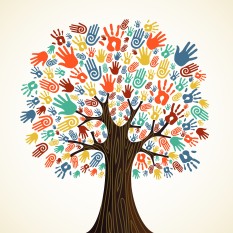Every poet from William Shakespeare to John Lennon has tried to define love. They all failed. Good. To precisely define a concept of such profundity is to trivialize and cheapen it. Such is the also the case with other notions of importance and among them is community. Community is being tested today in countries and companies and schools. Perhaps we owe it to ourselves to walk the poet’s mile toward community’s unattainable definition with the hope that the existential journey affords wisdom, or at least grace.
Community is a feeling. It grows from shared values, interests, experiences, and goals. We are social animals and so we naturally seek community. It is the yearning or circumstances that lead some to churches and others to street gangs. It is the warmth and smiles of a book club or slow pitch ball team.
National community is dynamic. Most of us are born, live, and die in one country. We find community in implicitly accepting the power of the state, complaining about government, and in the embrace of values that link we the people – the nation. It is community that brings us to our feet for the anthem and after a trip abroad makes the flag look so damn good. It is the national community we miss when emigrating and that offers culture shock to immigrants. The kind-of-heart see the national community as a quilt and celebrate each unique square. On the other hand, the frightened and angry – and those fanning the flames for political gain – tear at community by seeing it as an exclusive tree fort and advocate throwing “the other” out while pushing down the ladder.
 (Photo: http://www.asantecentre.org)
(Photo: http://www.asantecentre.org)
Corporate community is ephemeral. With new jobs, we sweat the interview, endure our rookie mistakes, and then eventually fit in. We contribute. We finally get the history and jokes. Some colleagues become friends. We become part of the team, part of the community. However, no matter how many casual Fridays, tipsy parties, mission statements, motivational speeches, or team building retreats we enjoy and endure, the boss is always the boss.
Sometimes the boss’ decisions lead to radical policy shifts or dismissals. Unexpected, poorly communicated, or unsupported decisions are painful for those whose experience is demeaned and beliefs belittled. They are tragic for the unfairly and suddenly gone and heartrending for those suffering survival guilt. All are stunned by the realization that they are not really valuable and valued members of a community but interchangeable units of labour. They become haunted. They become hunted. They are torn by the thought that their community is really not a community at all.
National and corporate community builders would do well to read David Rieff’s In Praise of Forgetting. He decries communities that commemorate every anniversary of some riot, battle, attack, or assassination with sparks of fresh rage. Rieff is not saying we should forget our past, but rather that we should learn to learn from it, accept it, and for the good of the community and ourselves, move on.
Linked to Rieff’s idea, and equally worthy of consideration, is the crazy thought that South Africa, the country that institutionalized racist discrimination, became the world’s model as to how a community recovers from a catastrophic past. The brilliant Nelson Mandela convinced not everyone but enough that speaking the truth of what happened, and why, and by whom, and to whom, would lead to reconciliation. Mandela did not say we should forget, rather that we should explain, understand, atone, and forgive. Canada is now trying the Mandela-Rieff ideas with its own Truth and Reconciliation Commission.
All communities live on trust. In Johannesburg, as in Ottawa and Washington, and as in every broken corporate or school community, slogans and tag lines mean nothing. Promises mean nothing. Office, title, and job description mean nothing. Hierarchy is a bad and sad joke. Teams made separate are made irrelevant. Truth untold is rumours confirmed. Communities remain strong and broken communities can only be made whole again when trust is unquestioned. Trust is born only of patience, empathy, respect, honesty, loyalty, and transparency. It is seen in how we treat others, all others, when there is no one else around and nothing to gain. Only those who understand that community is not mechanical but organic can contribute to regenerating trust. Those committed to silos or levels of power or walls of exclusion can’t build bridges.
We owe it to ourselves to preserve strong communities and reconstitute those that deserve recovery. We need to understand and celebrate the strength in those that are thriving. In others, we must mourn that which was broken and help those who were hurt. Let’s shun the shouters, dividers, and serial liars. Let’s ignore the cynics, sycophants, and saboteurs. Tomorrow’s community is for those who hope and work for better, armed with lessons learned and wisdom earned.
A values-based community offers explanation and inspiration, a ladder and a net, and shelter from the storm. It’s worth the work. And maybe that’s as close to a definition as we need.
If you enjoyed this column, please send it to others and consider checking my others at http://www.johnboyko.com
Another splendid piece, John Boyko. Thank you.
LikeLike
Came across this article by accident, stayed by intent. Beautifully put, thank you John. I’m sharing it, particularly with my (Australian) preaching class in seminary.
LikeLike
Thanks so much for your kind words.
John
LikeLike